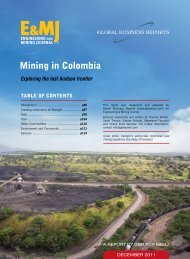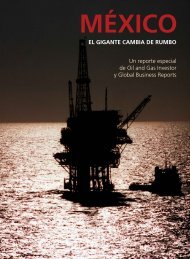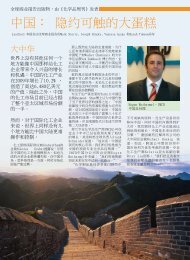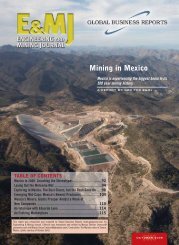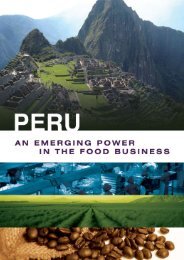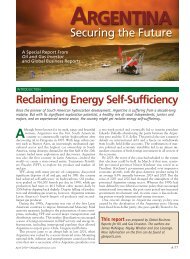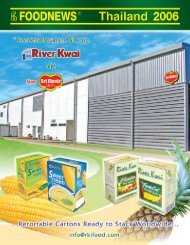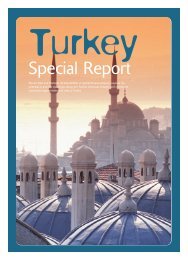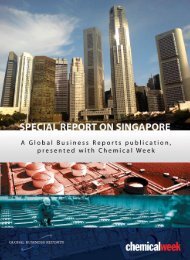Turkey Chemicals 2005 - GBR
Turkey Chemicals 2005 - GBR
Turkey Chemicals 2005 - GBR
Create successful ePaper yourself
Turn your PDF publications into a flip-book with our unique Google optimized e-Paper software.
COUNTRY FOCUS: TURKEY<br />
Petrochemicals:<br />
plastic hunger<br />
<strong>Turkey</strong> is a country<br />
with a very large<br />
and growing population.<br />
It is also now a<br />
prime destination for<br />
investment in areas such as<br />
consumer goods, textiles<br />
and automotives.As such, it<br />
is clearly a key market for<br />
petrochemical products and<br />
it displays a solid appetite<br />
for plastics. The Turkish<br />
Plastics Manufacturers<br />
Association, PAGEV, reckons<br />
that “currently Turkish<br />
annual polymer consumption<br />
of 2.8 million tons<br />
ranks the country 6th in<br />
Europe just behind Spain.<br />
However, the per capita<br />
consumption is far from<br />
saturation at 40 kg, (though<br />
it is higher than the world<br />
average) a clear indication<br />
of the bright future. When<br />
the consumption level<br />
reaches 75-100 kg, the level<br />
of developed countries,<br />
<strong>Turkey</strong> will become a significant<br />
player in the world<br />
plastic industry with its<br />
population of 70m.”<br />
Indeed, the $4bn market is<br />
already appealing and it<br />
would seem natural to see<br />
<strong>Turkey</strong> hosting major<br />
petrochemical complexes<br />
to feed the local demand<br />
and use its natural geographical<br />
advantage to become an export hub.<br />
Yet, domestic polymer production is relatively low and<br />
local production hardly covers one third of demand. Local<br />
players are predominantly state are at the crossroads of their<br />
destinies as both Tüpras, the country’s main refiner and<br />
Petkim, <strong>Turkey</strong>’s key petrochemical producer, had been<br />
expected to start their long-awaited privatization processes<br />
this year.<br />
Previous attempts to sell this entity, feeding up to 30% of<br />
the local demand for polyolefins, have run into controversies,<br />
delays, cancellations and have ended up by creating 17<br />
years of a public relations nightmare for the industry as a<br />
whole. The first petrochemical complex of Petkim was<br />
established at Yarımca and started production in 1970.<br />
Ethylene, Chlorine, Alkali, VCM, PVC and LDPE were<br />
added by the subsequent addition of CB, Styrene monomer,<br />
PS, BDX, SBR, CBR, DDB and caprolactam plants<br />
between 1972 and 1976. Due to rapidly growing domestic<br />
demand, the Yarımca<br />
Complex soon became<br />
insufficient and Petkim’s<br />
second complex was established<br />
at Aliaga in 1985.<br />
Later on, most of the<br />
Yarımca complex was<br />
decommissioned and the<br />
remaining 5 units producing<br />
SBR, CBR, CB, BDX<br />
and Polystyrene were<br />
acquired by Tüpras in<br />
2001, turning the refiner<br />
into one of the main petrochemical<br />
operators of<br />
<strong>Turkey</strong>.<br />
Today, Petkim controls<br />
the Aliaga complex, near<br />
Izmir, from where it<br />
churns out a total of 1.5m<br />
tons of products annually;<br />
400,000 tons of Ethylene,<br />
123,000 tons of benzene,<br />
516,000 tons of thermoplastics<br />
and a quarter million<br />
tons of raw fiber materials.<br />
Petkim is still the predominant<br />
petrochemical<br />
producer of <strong>Turkey</strong> but is<br />
nevertheless producing<br />
well below market needs<br />
and therefore expected to<br />
increase capacity to make<br />
the most of the markets<br />
hunger for plastics. The<br />
company is thus nurturing<br />
a number of expansions,<br />
most notably a $82m ethylene<br />
expansion to be<br />
completed in the first quarter of <strong>2005</strong>. “There is a 3 year<br />
opportunity on the world market to increase our capacity<br />
and benefit from the upward trend of the petrochemical<br />
market cycle, before Middle Eastern capacity arrives on the<br />
market” analyses Kenan Yavuz, Petkim’s newly appointed<br />
General Manager. “We are also looking at expanding thermoplastics,<br />
Polyethylene, Polypropylene, to reach 800Kt<br />
next year and our medium term goal is to reach 1.5m tons<br />
of thermoplastics production.”Within this scope of expansion,<br />
LDPE is expected to reach 310kt, and PP 144Kt.<br />
Petkim is already quite clearly benefiting from the positive<br />
petrochemical trend as it is expected to return to the<br />
black in 2004, after a series of loss-making years. So is<br />
everything rosy for Petkim ahead of its IPO? Definitely not,<br />
as Petkim is trying hard to secure long-term supplies to fuel<br />
both its current capacity and its forthcoming expansion: the<br />
ethylene cracker is a naphta based unit, and prices have continued<br />
upwards which has squeezed margins. Lately, Iranian<br />
42<br />
November 24, 2004<br />
A Global Business Reports Publication,presented with Chemical Week




